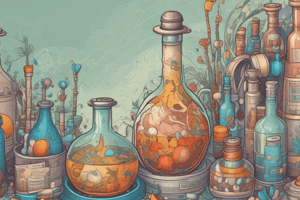Podcast
Questions and Answers
What is the study of the effects of drugs on living organisms?
What is the study of the effects of drugs on living organisms?
Pharmacology
What are the two main areas of study in pharmacology?
What are the two main areas of study in pharmacology?
Pharmacokinetics and pharmacodynamics
What is the branch of pharmacology that studies the adverse effects of drugs and other substances?
What is the branch of pharmacology that studies the adverse effects of drugs and other substances?
Toxicology
What is the final step in the drug development process, after clinical trials?
What is the final step in the drug development process, after clinical trials?
What type of interaction occurs between a drug and an underlying medical condition?
What type of interaction occurs between a drug and an underlying medical condition?
What is the term for a drug that binds to a receptor and partially activates it?
What is the term for a drug that binds to a receptor and partially activates it?
What is the study of how genetic variations affect an individual's response to drugs?
What is the study of how genetic variations affect an individual's response to drugs?
What is the process by which a drug is distributed throughout the body?
What is the process by which a drug is distributed throughout the body?
What type of study involves testing drug candidates in laboratory animals?
What type of study involves testing drug candidates in laboratory animals?
What is the term for a drug that binds to a receptor and blocks its activation?
What is the term for a drug that binds to a receptor and blocks its activation?
Flashcards are hidden until you start studying
Study Notes
Definition and Scope
- Pharmacology is the study of the effects of drugs on living organisms
- It involves the discovery, development, and testing of new medications
- Pharmacology encompasses the study of pharmacokinetics (what the body does to the drug) and pharmacodynamics (what the drug does to the body)
Branches of Pharmacology
- Pharmacokinetics: study of the absorption, distribution, metabolism, and excretion of drugs
- Pharmacodynamics: study of the effects of drugs on the body
- Toxicology: study of the adverse effects of drugs and other substances
- Pharmaceutics: study of the development and formulation of drugs
- Clinical Pharmacology: study of the effectiveness and safety of drugs in humans
Drug Development Process
- Discovery: identification of potential drug candidates
- Preclinical Trials: testing of drug candidates in laboratory animals
- Clinical Trials: testing of drug candidates in humans
- FDA Approval: review and approval of drug candidates by the Food and Drug Administration
- Post-Marketing Surveillance: ongoing monitoring of drug safety and efficacy after approval
Drug Interactions
- Drug-Drug Interactions: interactions between two or more drugs
- Drug-Food Interactions: interactions between drugs and food
- Drug-Disease Interactions: interactions between drugs and underlying medical conditions
Receptor Pharmacology
- Receptors: proteins that bind to specific molecules, such as drugs or hormones
- Agonists: drugs that bind to receptors and activate them
- Antagonists: drugs that bind to receptors and block their activation
- Partial Agonists: drugs that bind to receptors and activate them partially
Pharmacogenomics
- Pharmacogenomics: study of how genetic variations affect an individual's response to drugs
- Personalized Medicine: tailoring drug therapy to an individual's genetic profile
Definition and Scope
- Pharmacology is the study of the effects of drugs on living organisms, involving discovery, development, and testing of new medications.
- It encompasses pharmacokinetics (what the body does to the drug) and pharmacodynamics (what the drug does to the body).
Branches of Pharmacology
Pharmacokinetics
- Study of the absorption, distribution, metabolism, and excretion of drugs.
Pharmacodynamics
- Study of the effects of drugs on the body.
Toxicology
- Study of the adverse effects of drugs and other substances.
Pharmaceutics
- Study of the development and formulation of drugs.
Clinical Pharmacology
- Study of the effectiveness and safety of drugs in humans.
Drug Development Process
- Discovery: identification of potential drug candidates.
- Preclinical Trials: testing of drug candidates in laboratory animals.
- Clinical Trials: testing of drug candidates in humans.
- FDA Approval: review and approval of drug candidates by the Food and Drug Administration.
- Post-Marketing Surveillance: ongoing monitoring of drug safety and efficacy after approval.
Drug Interactions
- Drug-Drug Interactions: interactions between two or more drugs.
- Drug-Food Interactions: interactions between drugs and food.
- Drug-Disease Interactions: interactions between drugs and underlying medical conditions.
Receptor Pharmacology
- Receptors: proteins that bind to specific molecules, such as drugs or hormones.
- Agonists: drugs that bind to receptors and activate them.
- Antagonists: drugs that bind to receptors and block their activation.
- Partial Agonists: drugs that bind to receptors and activate them partially.
Pharmacogenomics
- Pharmacogenomics: study of how genetic variations affect an individual's response to drugs.
- Personalized Medicine: tailoring drug therapy to an individual's genetic profile.
Studying That Suits You
Use AI to generate personalized quizzes and flashcards to suit your learning preferences.




